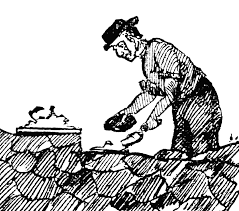记忆方法
记忆“mason”这个单词可以通过联想其词根“mas-”,联想到“mass”(块状物质),再想象一块石头,想象一个工匠手持工具,正在精细地雕刻一块石头,从而将“mason”与“mason”(石匠)这一职业联系起来。这样的视觉图像可以帮助你记忆单词的含义。
以上内容由AI生成, 仅供参考和借鉴
中文词源
mason 石匠,泥瓦匠,用砖瓦砌成
来自古法语masson,石匠,可能来自Proto-Germanic*mait,砍,劈,来自PIE*mai,砍,词源同smith,maim.或来自PIE*mag,揉,捏,形成,词源同make,massage.词义共济会缩写自Freemason.
英语词源
- mason
-
mason: [13] English originally acquired mason in the form machun, from Anglo-Norman. In the 14th century it was remodelled as masoun or mason on the basis of Old French masson. The derivation of this is disputed. Some etymologists claim that it comes via a Vulgar Latin *matiō from prehistoric Germanic *mattjon (source of German steinmetz ‘stonemason’), but an alternative theory traces it back to a Frankish *makjo, a derivative of *makōn ‘make’.
- mason (n.)
- c. 1200, "stoneworker" (as a surname, early 12c.), from Old French masson, maçon "stone mason" (Old North French machun), probaby from Frankish *makjo or some other Germanic source (compare Old High German steinmezzo "stone mason," Modern German Steinmetz, second element related to mahhon "to make;" see make (v.)). But it also might be from, or influenced by, Medieval Latin machio, matio (7c.) which is said by Isidore to be derived from machina (see machine). The medieval word also might be from the root of Latin maceria "wall." Meaning "a Freemason" is attested from early 15c. in Anglo-French.
权威例句
- 1. Mason was uninhibited in his questions about Foster's family.
- 梅森就福斯特的家庭毫无顾忌地发问。
- 2. He did impressions of Sean Connery and James Mason.
- 他对肖恩·康纳利和詹姆斯·梅森进行了滑稽模仿。
- 3. Mason went home for a couple of hours' kip.
- 梅森回家睡了几个小时。
- 4. Mr. Mason walked out during the performance.
- 梅森先生在演出时退场。
- 5. He carved marble faster than any mason.
- 他雕刻大理石的速度比任何石匠都快.

